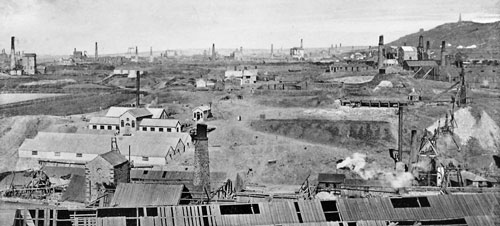The history of human civilization is closely linked to the exploitation of mineral resources. It is no coincidence that the periodization of prehistory and antiquity has been chosen according to the main metals in use: stone, bronze and iron. It shows the centrality of the exploitation and production of these mineral resources in human history. Since the Industrial Revolution metals have become global commodities, including tin. The importance of tin increased with the invention of canned food in the 19th century, and during the 20th century with the rise of the electronics industry. Both of these factors made tin a strategic resource not seen since the days that it was used in the production of bronze for weaponry.

The heart of the Cornish tin-mining district, looking from Dolcoath Mine
(on an unusually smoke-free day), ca. 1890. Source: Wikimedia Commons
A new edited book entitled Tin and Global Capitalism, 1850-2000: A History of the “Devil’s Metal”, explores the evolution of the global tin industry, from mining through the trade networks and the politics surrounding the strategic importance of tin. Interrogating the rhetoric of “strategic” raw materials is important in order to understand the social, political, and environmental effects of displacement of communities, environmental degradation and pollution, and ‘resource conflicts’.
This edition of the podcast explores these themes with the editors of Tin and Global Capitalism: Andrew Perchard, Senior Research Fellow in the Centre for Business in Society at Coventry University; Mats Ingulstad, Postdoctoral Fellow in the Department of Historical Studies, Norwegian University of Science and Technology (NTNU); and Espen Storli, Associate Professor in History at the NTNU.
Websites mentioned
History and Strategic Raw Materials Initiative
Details of the book on the publisher’s website
Music credits
“Where You Are Now” by Zapac, available from ccMixter
“Nightride” by remaxim, available from ccMixter
“Unfriendly Me” by Martijn de Boer (NiGiD), available from ccMixter


Recent Comments